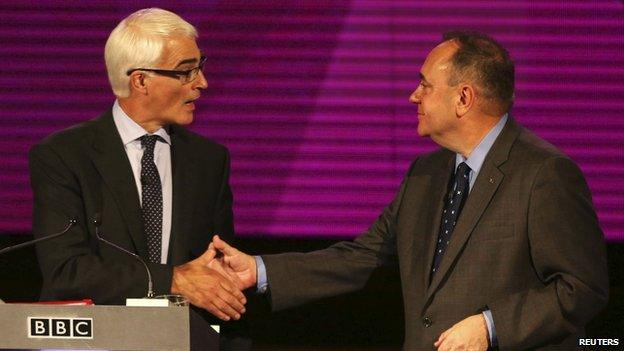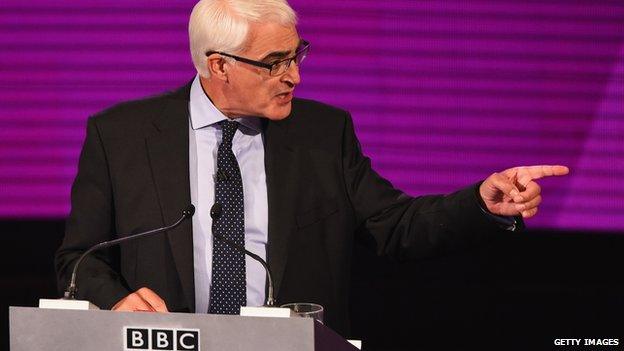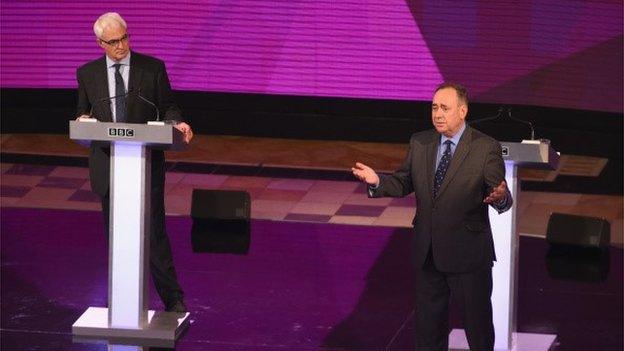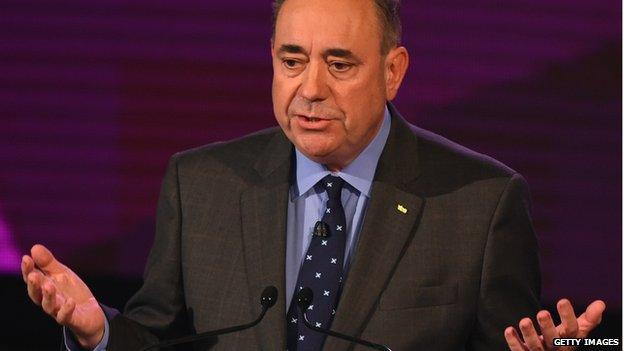The aftermath of debate round two
- Published

Alistair Darling and Alex Salmond went head to head in a live debate in Glasgow
Not a knock-out, then, but a clear points victory.
Alistair Darling was still standing, still in the ring, but it was Team Salmond who were smiling.
It was Yes supporters who left the Kelvingrove Art Gallery happy: some chanting, some even singing.
An intriguing night - and a remarkable venue. Broadcasting in advance from the balcony overlooking the main hall, I was perched between a Millais and a Lavery. Just opposite, protected in a small chamber, was Dali's Crucifixion.
There was art too - and not a little artifice - in the debate. Alex Salmond had plainly sketched out his scenario planning much more successfully than in the first televised encounter.
Unaccountably, he decided on this occasion to eschew questions about pandas and aliens. He chose instead to pursue Mr Darling on minor matters such as the current state of welfare provision - under the Union. And the future prospectus for tackling joblessness in Scotland - under the Union.
Opening salvo
On the night, he pursued this tack successfully. On the night, relentlessly chased by his rival, Mr Darling simply struggled to list the boasted advantages of the proposed new powers for devolved Scotland.

Alistair Darling's opening salvo was on currency
Equally, on the night, Mr Salmond managed to argue that welfare provision and the NHS stood in peril from continuing membership of the UK.
Mr Darling argued that the first required UK-wide funding and support - and that the second, the claims about the health service, amounted to baseless scaremongering. But, on the night, Mr Salmond seemed more assured.
Which brings us to currency - the issue where Mr Salmond palpably faltered in the first debate. (Aside, that is, from the first minister's curious choice of interrogation topics.)
There was a question from an audience member on currency. Mr Darling made it his opening salvo when challenging his rival directly.
Mr Salmond did not wait for either, moving to the front of the stage at the very outset to address the question of the pound sterling.
By this tactic, which he repeated, he was metaphorically and literally turning his back on Alistair Darling while addressing the audience directly, both in the hall and at home.

Alex Salmond often left his podium to move to the front of the stage
And was there sight of the fabled Plan B? Not in solitary fashion.
Instead, Mr Salmond said a range of options lay available: a pegged Scottish currency, a floating Scottish currency and unilateral use of sterling. Not, you will note, the euro. Its name is still a hissing and a byword.
This was designed to emphasise that he was not solely thirled to one plan, without consideration of alternatives. However, his firm preference remained for a sterling union with the remainder of the UK, rUK.
Echoes of 1997
Instead of simply stating that, however, Mr Salmond relied upon a formula which he has promulgated on occasion, notably in Holyrood, since the relative trauma of the first debate.
This is to argue that a vote for Yes implies a democratic mandate for the particular independence prospectus advanced in the White Paper, including a sterling union.
Here, there is an eerie echo of elements of the 1997 referendum - where it was frequently claimed in advance by critics that people were being asked to endorse an early draft of devolution without knowing what might emerge after scrutiny of the plan in the Commons and the Lords.
In the event, popular support was so clear, both for a devolved parliament and for tax-varying powers, that such talk evaporated. Yes, there was scrutiny at Westminster but, in practice, the mandate of the 1997 referendum was obeyed and there was a clear read-through from cross-party Convention, to White Paper, to Scotland Act.
Does that also apply here? Alistair Darling would say definitely not. Indeed, he said so last night.
His argument is that a Yes vote only indicates the will of the people of Scotland for independence. It does not - could not - mandate the party of the second part, rUK. The people of the remainder of the UK would be entitled to take their own stand in negotiations on issues such as the currency.
To be fair, Mr Salmond acknowledged that point - while laying considerable emphasis in debate upon the popular mandate which would ensue from a Yes vote in the referendum.

Alex Salmond claimed a "popular mandate" would come from a "Yes" vote
His argument, in essence, was that he would be mandated as first minister to lead negotiations on behalf of what he called Team Scotland with rUK - and that part of that mandate would be the requirement for a currency zone.
However, negotiations there would be. Not an absolute guarantee. Discussions. Mr Salmond relies upon two points: that he would be entering those talks with a popular mandate and that it would be in the interests of rUK to endorse a currency union.
A palpable hit
The first minister made another point. In essence, he challenged Mr Darling to name his own Plan B. You back the Union, he argued. We get the concept.
Say, however, the people vote Yes. What then? Would you, Mr Darling, as other supporters of the Union have done, argue in those circumstances for a currency union?
Mr Darling said resolutely no: that it would not serve either Scotland or rUK. Once again, on the night, this tactic of returning the Plan B question to his rival served Mr Salmond well.
Alex Salmond won. It was a hit, a very palpable hit. Several, indeed. How about the impact upon the referendum?
I have been struck by how many have commented upon the "shouty" nature of the debate. I must confess that, personally, I am less concerned by that factor. But I have heard it mentioned, in conversation and on air, on numerous occasions.
Might that prompt some to say "a plague on both their houses"? I think not. I have never seen people so engaged in a political process.
I think folk will take what they want, what they need from the debate - and set it alongside other motivations: family discussions, their own research, their own thoughts and feelings.
One further thing. Last night's debate will undoubtedly energise the Yes camp still further - or, perhaps more precisely, lift any slight tinge of gloom persisting from the first televised outing.
Ultimately, though, the people will decide.